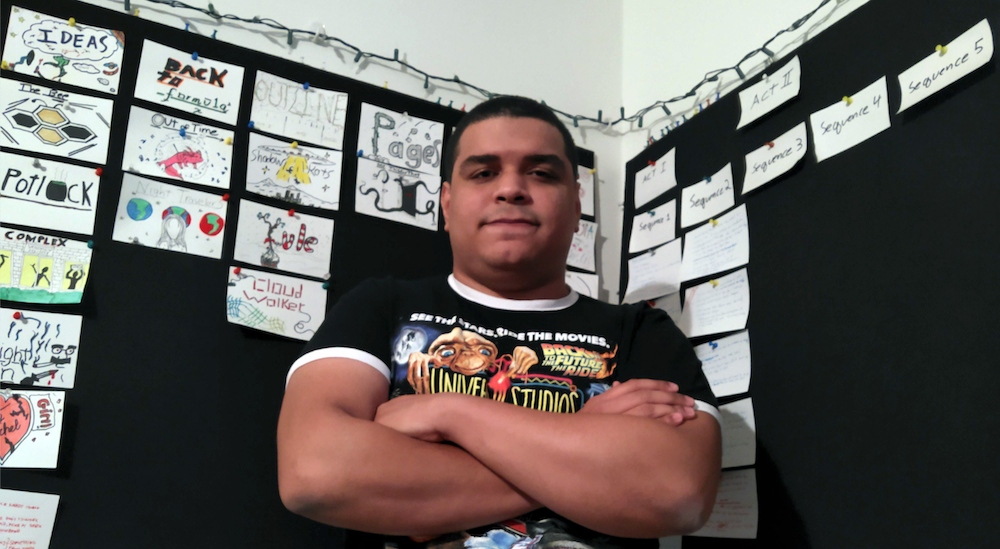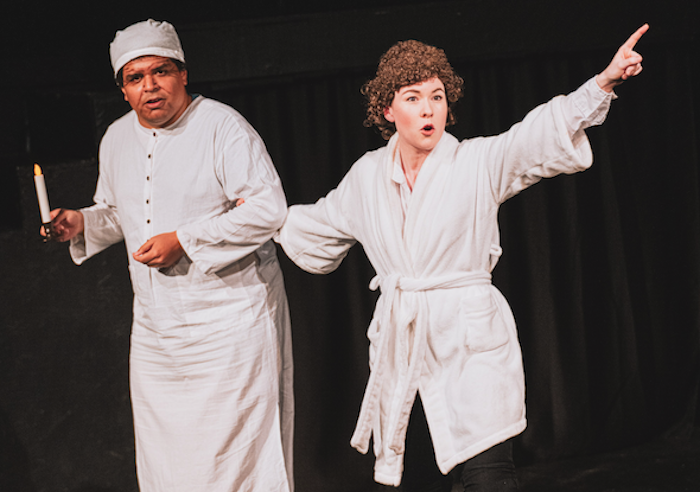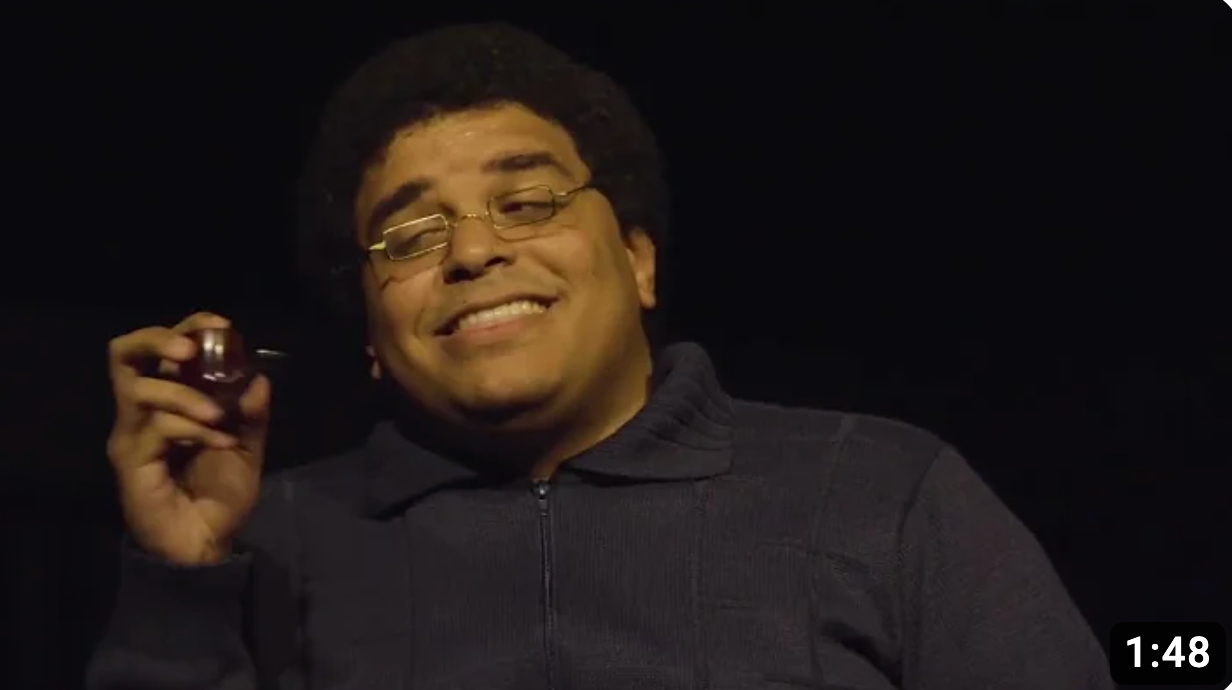“Life's like a movie, write your own ending. Keep believing, keep pretending…”—Jim Henson, legendary inventor & filmmaker & the creator of the Muppets.
Screenwriter Michel Lichand. Loves. Collaboration.
Lichand has been in several writer “rooms” including sketch comedy team “Rabble Rabble,” and with the writing team for the highly anticipated modification of the Fallout 4 videogame. And, one of his role models was also a big fan of team work: “Jim Henson not only created iconic characters and timeless stories, but also did his best to develop a nurturing and collaborative environment, where people could learn, improve and then take those skills to work on their own ideas. That's exactly what I want to do.”

As a result, it’s no surprise that Brazil-born but now LA-based Lichand, who loves nothing better than a good laugh, cites an interesting character that he’d love to work with, jesting: “Kermit the Frog, who Henson introduced in his first television show Sam and Friends in 1955. Kermit has his own star on the Hollywood Walk of Fame, so he’d be great to work with.”
In fact, Lichand quite rightly notes that Kermit has appeared and “worked” with a host of A-list stars on The Muppet Show, including Superman, himself, Christopher Reeve. But, in terms of working with real people, Lichand says, “I would love to one day be in the same room as 'Weird' Al Yankovic, and also Scott Aukerman, who’s best known for his work on the 1990s HBO sketch comedy program Mr. Show. They're some of the consistently funny minds working in comedy at the moment. Anyone who manages to stay 'on top' for over 30 years without ever losing a step is certainly doing something right. And what astounds me about both of them is how they manage to remain fresh despite the fact they're both 'old souls' of comedy.” And, as for what he could bring to “to the table” for them, Lichand can’t help himself, quipping. “It'd be coffee with or without creamer.”
Funny lad. But, Lichand, who admits to “love making people laugh,” has already interned at Walt Disney, and presently writes for the videogame Fallout: London and also for Pocket FM, an international audio entertainment platform that adapts webnovels from Korean/Chinese platforms into audiobooks for western audiences.
"Michel is an invaluable part of my staff. He is wicked smart. He knows story backwards, forwards and upside down. He is someone who takes initiative. And, finally he’s someone that you can rely on to get the job done. He makes it so that I can say--I wouldn't want to do the job without him."—Stephen Bozzo, Head of Growth at Pocket FM, which has 100 million listeners worldwide
This intimate understanding of “story” that Bozzo talks about in Lichand, has its roots back in his childhood where Michel relates, “My family back in Sao Paulo always encouraged me to pursue all artistic endeavors. When I was seven, I wrote and drew a book that I submitted to my school's library. I wrote a lot of comic books for myself and my friends. My mom always pushed me to try new avenues of self-expression, including tap dancing. And, she gave me an appreciation of movies and TV, so she's the reason why I do what I do. She once got me the DVD for Monsters Inc, one of my favorite movies growing up, and I spent hours watching the featurettes about the making of the movie. That made me realize that these movies are made by human beings like you and me, which meant one day I could make a movie.”

However, there were natural obstacles pursuing his career in Brazil, with him admitting, “I knew from the moment I graduated high school that I wanted to be a screenwriter, but in Brazil there's not really a clear-cut educational path for screenwriting.” And then in his last year of college in Brazil, he realized that the kind of writing he wanted to do would be more at home in the US which led to him attending USC where he studied an MFA in Writing for Screen and Television.
Coincidentally, he’d already been a big fan of writer/director Robert Zemeckis, who had previously attended USC where Lichand informs us that the director met Bob Gale with whom he co-wrote Back to the Future, and where he came to the attention of Steven Spielberg, who produced most of Zemeckis’ early movies. Anyway, Lichand continues, “Basically, I knew there was a lot of prime raw material in my head—I knew how storytelling worked and why stories worked but I couldn't put it into words. I felt as if USC could help me turn that raw material into something that could actually be put into the page and on the screen. I was absolutely right.”
So, now, Lichand’s involvement in “entertainment’s” varied storytelling process has expanded, and it includes: working at BOOM! and seeing what the development process looks like when it comes to adapting pre-existing IPs; working as an assistant to executives at Lionsgate Games, writing for projects based on Lionsgate properties such as Rambo, Evil Dead, John Wick and Saw; and, working as a script reader and contest judge for companies such as Rideback, Wayfarer Studios and NYCMidnight.
“If you care about what you do and work hard at it, there isn't anything you can't do if you want to.”—Jim Henson
Michel Lichand, who claims “a perfect blend of collaborative writing and comedy keeps me happy…and also sane,” talks to us about what he’s learned about the entertainment industry, and what goals he has. And, also about some advice he found—Hope for the best, expect the worst.

What movies and their storytelling appealed to you growing up?
The big movie that made me realize what storytelling could be was Back to the Future, co-written and directed by Zemeckis. I first saw it in 2007 and I remember watching the entire trilogy in a weekend. And then I watched it again and again and again and haven't stopped watching it since. And after that, I spent such a long time reading up on how the movie was written, going as far as hunting down some early drafts of the script. It was the first script I ever read.
Speaking of which, what have you learned as a script reader?
Consulting for these big companies and studios, I’ ve learned that when people boast about being able to tell if a script is good or not from the first five pages, they're actually telling the truth. Most of the scripts I read did not cut the mustard. That doesn't mean they were bad, in fact, I'd say the majority of scripts I read for clients were in the 'OK' category, and only a few were truly awful. But when you're one script in a sea of thousands of scripts, being OK isn't enough. There needs to be something that'll make you shine through and float up to the surface. Those are the scripts that win the competitions I read for, plain and simple—scripts that pick one lane and work on it as much as possible.
Let’s talk about another storytelling experience, what have you learned about videogames?
I grew up surrounded by videogames, Banjo Kazooie, The Sims, Rollercoaster Tycoon, Super Mario 64, every game that just let me loose in a big expansive world—sometimes of my own making—was like catnip to me. So, I've always been fascinated with the interactive aspect of this particular medium. Additionally, the most appealing thing about writing for games—like contributing to Fallout: London—is that it's where the line between audience and story is at its thinnest. When you watch a movie, or read a book, or see a play, there's always that fourth wall separating you and the plot. Some stories try to break the fourth wall, sure, but no matter what they do, there's always some kind of separation—you can turn off the movie, close the book, or leave the theater. Not with games. That line rarely exists because you are a character within the story. And that leads to all sorts of creative ideas you can't do in other mediums. But it also leads to its own set of challenges—the writing in a game often undergoes more scrutiny than the writing in a movie, because the audience aren't just viewing the story, they're playing it. It's the writing equivalent to free-solo climbing—exciting, but also very, very dangerous. One little slip and the illusion goes away, and all you're left with is an unengaging and unexciting game.
What could be the impact of AI on the gaming industry?
There's two possible ways that AI can impact the gaming industry. It can be used to facilitate the work of various departments, essentially taking over the busy work and freeing people to explore and focus on grander new ideas. Or, it can be used to replace labor in exchange for losing the nuance that only happens when you have a bunch of humans working together. I hope it's the former, because I think the latter sounds far too boring to interest me. Overall, AI is a tool, and like all tools, its impact will be dictated by the people who wield it. And since this is show business, the question should be which hand is going to hold the hammer—the show or the business.
Writing for the comedy sketch team “Rabble Rabble”—how does this type of storytelling inspire you?
I do love making people laugh, and when it comes to that, there's nothing more satisfying than live sketch comedy. Not just because you get to hear the laughter and the reactions, but also because the gap between the moment you put pen to paper and the moment when your work goes out into the world is significantly shortened. It's a surefire way to refine your comedic point of view, because you quickly learn what 'funny' really is, and how you can get to that 'funny' idea without being bogged down by 'amusing' thoughts. If you want to make people laugh for a living, get into sketch comedy.
What makes you unique, what special skills do you bring to the table for producers and projects?
Do you know any other Black Latinx Jewish queer comedy writers? Because if you do, tell me so I can get rid of my competition. All joking aside, my big special skill is collaboration. I pride myself in always trying to be the best collaborator in the room, even if it means not getting any of my lines or ideas in. As long as the final project is the best possible version of itself, I'm satisfied!
What are your goals in the entertainment biz, Michel?
I'd very much like to be in more writer's rooms. Whether that is as an assistant or as a writer, it doesn't matter. I just want to be there and to be a part of that process so I can learn as much as possible. Long-term, I'd like to one day have my own production company so I can support and develop ideas from artists that hail from underrepresented communities.

Drop in on Michel Lichand on LinkedIn, and check out his team at the Rabble Rabble website, and on its YouTube Channel.







Leave your comments
Post comment as a guest